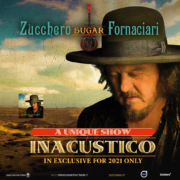“Cavalleria Rusticana”
by Pietro Mascagni
and
“I Pagliacci”
by Ruggero Leoncavallo
Ancient Theatre, Wednesday 16th August 2023 @ 9.00pm
Co-production Taormina Arte and Hungarian State Opera House
Conductor Marco Guidarini
Direction by Georges Delnon
Lighting Design Bruno Ciulli
Maestro del Coro: Petrozziello
Chorus Francesco Cilea
Taormina Art Festival Orchestra
With Alessandra di Giorgio (Santuzza, Nedda), Marco Berti (Turiddu, Canio), Alberto Gazale (Alfio, Tonio), Annunziata Vestri (Lucia)
TICKETS on boxol and ticketone
Gallery: € 150,00
Upper Circle (non numbered circle): 50,00
PAGLIACCI – Synopsis
PLACE: Calabria, south Italy, near Montalto, on the Feast of the Assumption – Time: between 1865 and 1870.
Prologue
During the overture, the curtain rises. From behind a second curtain, Tonio, dressed as his commedia character Taddeo, addresses the audience (Si può?… Si può?… Signore! Signori! … Un nido di memorie). He reminds the audience that actors have feelings too, and that the show is about real people.
Act 1
At three o’clock in the afternoon, the commedia troupe enters the village to the cheering of the villagers. Canio describes the night’s performance: the troubles of Pagliaccio. He says the play will begin at “ventitré ore”, an agricultural method of time-keeping that means the play will begin an hour before sunset. As Nedda steps down from the cart, Tonio offers his hand, but Canio pushes him aside and helps her down himself. The villagers suggest drinking at the tavern. Canio and Beppe accept, but Tonio stays behind. The villagers tease Canio that Tonio is planning an affair with Nedda. Canio warns everyone that while he may act the foolish husband in the play, in real life he will not tolerate other men making advances to Nedda. Shocked, a villager asks if Canio really suspects her. He says no, and sweetly kisses her on the forehead. As the church bells ring vespers, he and Beppe leave for the tavern, leaving Nedda alone.
Nedda is frightened by Canio’s vehemence (Qual fiamma avea nel guardo), but the birdsong comforts her (Stridono lassù). Tonio returns and confesses his love for her, but she laughs. Enraged, Tonio grabs Nedda, but she takes a whip, strikes him and drives him off. Silvio, who is Nedda’s lover, comes from the tavern, where he has left Canio and Beppe drinking. He asks Nedda to elope with him after the performance and, though she is afraid, she agrees. Tonio, who has been eavesdropping, leaves to inform Canio so that he might catch Silvio and Nedda together. Canio and Tonio return and, as Silvio escapes, Nedda calls after him, “I will always be yours!”
Canio chases Silvio, but does not catch him and does not see his face. He demands that Nedda tell him the name of her lover, but she refuses. He threatens her with a knife, but Beppe disarms him. Beppe insists that they prepare for the performance. Tonio tells Canio that her lover will give himself away at the play. Canio is left alone to put on his costume and prepares to laugh (the famous Vesti la giubba – “Put on the costume”).
Act 2
As the crowd arrives, Nedda, costumed as Colombina, collects their money. She whispers a warning to Silvio, and the crowd cheers as the play begins.
Colombina’s husband Pagliaccio has gone away until morning, and Taddeo is at the market. She anxiously awaits her lover Arlecchino, who comes to serenade her from beneath her window. Taddeo returns and confesses his love, but she mocks him. She lets Arlecchino in through the window. He boxes Taddeo’s ears and kicks him out of the room, and the audience laughs.
Arlecchino and Colombina dine, and he gives her a sleeping potion to use later. When Pagliaccio returns, Colombina will drug him and elope with Arlecchino. Taddeo bursts in, warning that Pagliaccio is suspicious of his wife and is about to return. As Arlecchino escapes through the window, Colombina tells him, “I will always be yours!”
As Canio enters, he hears Nedda and exclaims “Name of God! Those same words!” He tries to continue the play, but loses control and demands to know her lover’s name. Nedda, hoping to keep to the performance, calls Canio by his stage name “Pagliaccio,” to remind him of the audience’s presence. He answers with his arietta: No! Pagliaccio non son! He sings that if his face is pale, it is not from the stage makeup but from the shame she has brought him. The crowd, impressed by his emotional performance, which they do not realize is real, cheers him.
Nedda, trying to continue the play, admits that she has been visited by the innocent Arlecchino. Canio, furious and forgetting the play, demands the name of her lover. Nedda swears she will never tell him, and the crowd realizes they are not acting. Silvio begins to fight his way toward the stage. Canio, grabbing a knife from the table, stabs Nedda. As she dies she calls: “Help! Silvio!”. Silvio attacks Canio, but Canio ends up killing him as well. After completing the murders, Canio turns to the horrified audience and proclaims the play’s now famous finishing line:
La Commedia è finita! – “The comedy is finished!”
CAVALLERIA RUSTICANA – Synopsis
Place: A 19th-century Sicilian village Time: Easter morning
Before the action takes place, the young villager Turiddu had returned from military service to find that his fiancée Lola had married the carter Alfio while Turiddu was away.[9] In revenge, Turiddu had seduced Santuzza, a young woman in the village. As the opera begins, Lola, overcome by her jealousy of Santuzza, has begun an adulterous affair with Turiddu.
The main square of the village
Offstage, Turiddu is heard singing The Siciliana – “O Lola, lovely as the spring’s bright blooms”. To one side is the church; to the other is Lucia’s wine shop and the house where she lives with her son, Turiddu. The villagers move about the square, singing of the beautiful spring day (Gli aranci olezzano sui verdi margini – “The air is sweet with orange blossoms”) and a hymn to the Blessed Virgin. Some villagers enter the church, and others wander off still singing.
Santuzza, having slept with Turiddu and suspecting that he has betrayed her for Lola, is distraught and approaches Lucia as she comes out of her house. Santuzza asks for Turiddu, but Lucia replies that he has gone to another town to fetch some wine. Santuzza tells her that he was seen during the night in the village. Lucia asks her inside to talk, but just at that moment Alfio arrives on his wagon, accompanied by the villagers. He praises the joys of a teamster’s life and the beauty of his bride. Alfio asks Lucia for some of her fine old wine. She tells him it has run out and Turiddu has gone away to buy more. Alfio replies that he had seen Turiddu early that morning near his cottage. Lucia starts to express surprise, but Santuzza stops her.
Alfio leaves. The choir inside the church is heard singing the Regina Coeli. Outside, the villagers sing an Easter Hymn, joined by Santuzza. The villagers enter the church, while Santuzza and Lucia remain outside. Lucia asks Santuzza why she signalled her to remain silent when Alfio said that he had seen Turiddu that morning. Santuzza exclaims, Voi lo sapete – “Now you shall know”, and tells Lucia the story of her seduction by Turiddu and his affair with Lola. Lucia pities Santuzza, who the villagers are considering excommunicating for her seduction. Santuzza cannot enter the church, but begs Lucia to go inside and pray for her.
Turiddu arrives. Santuzza upbraids him for pretending to have gone away, when he was actually seeing Lola. Lola enters the square singing. She mocks Santuzza and goes inside the church. Turiddu turns to follow Lola, but Santuzza begs him to stay. Turiddu pushes her away. She clings to him. He loosens her hands, throws her to the ground, and enters the church. Alfio arrives looking for Lola. Santuzza tells him that his wife has betrayed him with Turiddu. Alfio swears to take vendetta (revenge) which causes Santuzza to repent for having disclosed the affair and begs Alfio to stop to no avail.
The square is empty as the orchestra plays the famous Intermezzo.
The villagers come out of the church. Turiddu is in high spirits because he is with Lola and Santuzza appears to have gone. He invites his friends to his mother’s wine shop where he sings a drinking song, Viva, il vino spumeggiante – “Hail to the bubbling wine!”. Alfio joins them. Turiddu offers him wine, but he refuses it. All understand that trouble is in the air. The women leave, taking Lola with them. In a brief exchange of words, Alfio challenges Turiddu to a duel. Following Sicilian custom, the two men embrace, and Turiddu, in a token of acceptance, bites Alfio’s ear, drawing blood which signifies a fight to the death. Alfio leaves and Turiddu calls Lucia back. He tells her that he is going outside to get some air and asks that she be a kindly mother to Santuzza if he should not return: Un bacio, mamma! Un altro bacio!—Addio! – “One kiss, mother! One more kiss! – Farewell!”.
Turiddu rushes out. Lucia, weeping, wanders aimlessly around outside her house. Santuzza approaches and throws her arms around her. The villagers start to crowd around. Voices are heard in the distance and a woman cries, “They have murdered Turiddu!” Santuzza faints and Lucia collapses in the arms of the women villagers.
MORE INFO
Fondazione Taormina Arte – info@taorminaarte.org – T. 0039 391 746 2146
WHERE TO STAY
Hotel La Pensione Svizzera – Hotel Villa Schuler – Hotel Villa Ducale – Hotel Villa Carlotta









